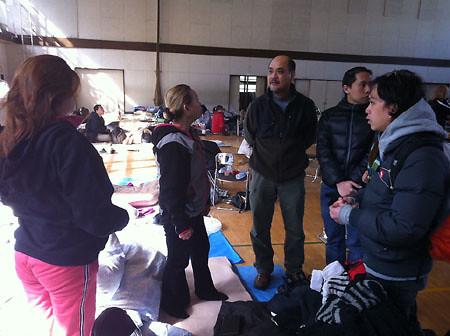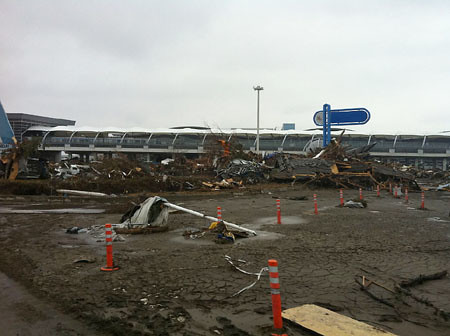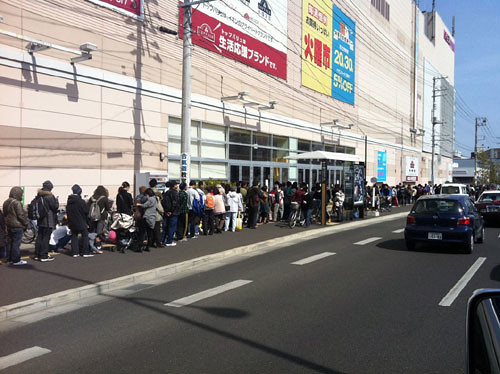Filtered by: Topstories
News
Reporter's journey to Sendai reveals Japanese virtues
By CHINO GASTON, GMA News
GMA News reporter Chino Gaston and cameraman Melchor Quintos made it to Japan’s most devastated city. Gaston reports that amid the disaster, the Japanese are exhibiting awe-inspiring calm and discipline. Their van running low on gas, Chino Gaston made a desperate suggestion to his Japanese driver, whose reply made the Filipino feel ashamed. We reached tsunami-devastated Sendai in northeastern Japan with only the clothes on our backs and the small supply of water we carried in our day packs. Our GMA News team had joined a Philippine consulate team sent to Sendai to check on the Filipinos there. We had arrived in Tokyo on March 13 with full provisions, but as we waited at the Philippine embassy that same day to interview the ambassador, we received a sudden invitation to join the government team about to leave for the site of devastation. Hence, there was no time to pick up our provisions. Like many others in Japan, we had to rely on the generosity of strangers to get us through the bitter-cold days and nights. Our convoy was allowed to pass through the otherwise closed Tohoku Expressway linking Tokyo with Sendai. It had been closed for the past few days due to the explosion at Fukushima's nuclear power plant which was a scant 50 kilometers away from the area where the expressway passed through Fukushima. Upon entering Sendai, the bright lights and demeanor of people walking through the streets seemed a stark contrast to the images shown on TV of a tsunami-ravaged coastline and rescuers combing through the muddy ruins of the city.  Our driver Tosho-san quickly explained that we were in Sendai's central district up in the mountains and that we were still five minutes from the coastal destruction. A trip to the grocery however revealed the harsh reality here. Most shops were already closed and the ones that remained open were rationing what they sold to each person. There have been no reports that Filipinos had perished in the tsunami. But the embassy staff have only gotten in touch with less than a hundred of the estimated 1500 Filipinos living in Miyagi Prefecture, where Sendai City is the main population center. We found added solace in the warmth and kindness of our fellow Filipinos living in Sendai, many of them women married to Japanese. Despite the uncertainty they faced, our kababayan welcomed journalists and embassy staff to their homes and shared their limited water and food. While some wanted to be evacuated to Tokyo for fear of another earthquake and possible radiation exposure from the damaged Fukushima nuclear plant, most wanted to stay and be with their Japanese spouses. Not a single Japanese we met was even considering leaving Sendai.
Our driver Tosho-san quickly explained that we were in Sendai's central district up in the mountains and that we were still five minutes from the coastal destruction. A trip to the grocery however revealed the harsh reality here. Most shops were already closed and the ones that remained open were rationing what they sold to each person. There have been no reports that Filipinos had perished in the tsunami. But the embassy staff have only gotten in touch with less than a hundred of the estimated 1500 Filipinos living in Miyagi Prefecture, where Sendai City is the main population center. We found added solace in the warmth and kindness of our fellow Filipinos living in Sendai, many of them women married to Japanese. Despite the uncertainty they faced, our kababayan welcomed journalists and embassy staff to their homes and shared their limited water and food. While some wanted to be evacuated to Tokyo for fear of another earthquake and possible radiation exposure from the damaged Fukushima nuclear plant, most wanted to stay and be with their Japanese spouses. Not a single Japanese we met was even considering leaving Sendai.  Lining up for supplies in front of a department store, I could not help but admire the composure and discipline of the Japanese. Those I interviewed admitted they were worried and that the situation was indeed dire, but they remained polite and willing to answer questions from a nosy journalist. One young man was waiting in line with his sister and told me he was going inside the department store to buy whatever was still being sold. Elsewhere, Japanese students were giving away free onigiri, or rice balls, as well as miso soup to people in evacuation centers. Outside, kids were sweeping the grounds and picking up litter and debris from the earthquake. Even inside the devastated Sendai International Airport where cars, planes and buildings had been strewn about like toys, there was no sign of looting. People using the terminal as a shelter did not even touch the food and water inside the many food shops that had been abandoned. Since the supply of fuel was severely limited and difficult to purchase, I innocently asked our driver Tosho-san if there was a possibility of siphoning fuel from the wrecked vehicles strewn all over the coast.
Lining up for supplies in front of a department store, I could not help but admire the composure and discipline of the Japanese. Those I interviewed admitted they were worried and that the situation was indeed dire, but they remained polite and willing to answer questions from a nosy journalist. One young man was waiting in line with his sister and told me he was going inside the department store to buy whatever was still being sold. Elsewhere, Japanese students were giving away free onigiri, or rice balls, as well as miso soup to people in evacuation centers. Outside, kids were sweeping the grounds and picking up litter and debris from the earthquake. Even inside the devastated Sendai International Airport where cars, planes and buildings had been strewn about like toys, there was no sign of looting. People using the terminal as a shelter did not even touch the food and water inside the many food shops that had been abandoned. Since the supply of fuel was severely limited and difficult to purchase, I innocently asked our driver Tosho-san if there was a possibility of siphoning fuel from the wrecked vehicles strewn all over the coast.  His answer made me feel ashamed. Tosho-san told me if we did that he wanted no part of it since he did not want to join us in hell. This same man would bid us an emotional farewell a day later after his vehicle ran out of fuel in the middle of the highway and we transferred to another. Tosho-san refused to join us when we told him to stay in our hotel or be with the Filipinos we met holed up in their homes. He said he would stay in his car and trust his government to help him get back to Tokyo. As we left him standing beside his van, Tosho-san shouted, "Get out from Sendai while you still can!" We watched him shrink in size from the window just as snow began to fall softly on the stricken city. – HS, GMA News
His answer made me feel ashamed. Tosho-san told me if we did that he wanted no part of it since he did not want to join us in hell. This same man would bid us an emotional farewell a day later after his vehicle ran out of fuel in the middle of the highway and we transferred to another. Tosho-san refused to join us when we told him to stay in our hotel or be with the Filipinos we met holed up in their homes. He said he would stay in his car and trust his government to help him get back to Tokyo. As we left him standing beside his van, Tosho-san shouted, "Get out from Sendai while you still can!" We watched him shrink in size from the window just as snow began to fall softly on the stricken city. – HS, GMA News

PHL Embassy team in Japan meets with Filipino evacuees at a relief center in Takomachi Elementary School in Sendai City on Monday. Chino Gaston

Mud and debris litter the airport in Sendai City, four days after the quake and tsunami. Chino Gaston

Despite their desperation, Japanese residents of tsunami-devastated Sendai calmly line up for food and relief supplies. Chino Gaston
Find out your candidates' profile
Find the latest news
Find out individual candidate platforms
Choose your candidates and print out your selection.
Voter Demographics
More Videos
Most Popular





